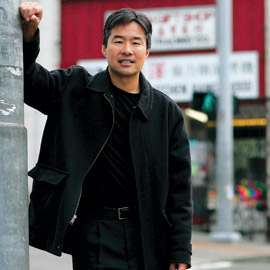|
Life Stories
Filmmaker Records the Memories of Japanese Americans Interned During World War II
"To pass stories on to the next generation”
— that’s the literal meaning
of “Densho,” the name of a nonprofit organization based in Seattle and founded by filmmaker Tom Ikeda. But the word also means “reparation,” “remembrance,” and even “reconciliation.” All are ideas central to the mission of this unique venture.

 Densho, a first-of-its-kind organization led by Tom Ikeda, is based in Seattle’s International District,
where many local Japanese Americans celebrate their culture and community. Densho, a first-of-its-kind organization led by Tom Ikeda, is based in Seattle’s International District,
where many local Japanese Americans celebrate their culture and community.
|
 |
Ikeda, who recently won the Humanities Washington Award for his work collecting the oral histories of Japanese Americans interned during World War II, has devoted his “second career” to internment history and its impact on community.
It’s a topic that Ikeda discussed with Seattle Pacific University students on two occasions last spring. He spoke to the Mosiac cadre and also visited an undergraduate history class. Katie Stalley, SPU senior and president of Histeria!, a student history club, is an admirer of Ikeda’s work. “His project is an inspiration of hope,” she says.
If you’re looking for Densho
films, you won’t find them on the big screen. Try the Internet instead. Ikeda credits his inspiration to
Stephen Spielberg’s Shoah project — a similar collection
of the memories of Holocaust survivors. Envisioning
a comparable, Web-based approach for telling the individual stories of Japanese Americans, Ikeda says he sought an application that educators could use in the classroom.
“I wanted to provide a good resource for my children, and other students, to learn what happened to Japanese Americans,” says Ikeda, himself the son of interned parents. It was
a cause worthy enough to draw the former Microsoft executive out of retirement.
Funded by private donors, fund-raising events, and grants, Ikeda’s organization has interviewed more than 200 Japanese Americans. “There has never been anything
like this before,” says Ikeda of Densho. Its Web site receives more than 5,000 hits a month from students, teachers,
and citizens across the country interested in viewing the documentary-style interviews.
“The stories you’ll hear are greater than just, ‘I was in an internment camp, and these horrible things happened to me,’” explains Ikeda. “It’s bigger than that. They are life
stories — great life stories.
“In the last eight years, as I’ve been collecting
these stories, I’ve seen a lot of healing.
It’s been cathartic for people. It’s sort of like a weight off their shoulders.”
But Ikeda says there’s another focus to Densho’s interviews. “We speak to people of non-Japanese descent too,” he says. One such person is Seattle Pacific alumnus Brooks Andrews ’62, whose father was the pastor of Seattle’s Japanese Baptist Church in the 1940s. Andrews was 5 years old in 1942 when the majority of his father’s congregation was incarcerated
and sent to Minidoka, the notorious internment camp near Twin Falls, Idaho.
“Reverend Andrews took his family to Idaho, so he could be close to his congregation,”
says Ikeda. “Brooks remembers his dad going into a café, and the owner physically throwing him out.”
That wasn’t all, says Ikeda. “Then the restaurant
owner bought the family’s rented house, and kicked them out of their home.
“They were called ‘Jap-lovers,’” he says quietly.
“Being there was a huge sacrifice for the Andrews family, and it took a lot of courage.”
These are the stories Ikeda wants others to hear. As he films
them, he is one-part historian, one-part filmmaker, and one-part
friend. “Although these people did nothing wrong, there’s this sort of shame and guilt associated with being put into a prison camp,” he says, explaining Densho’s vision for reconciliation. “Just the ability to talk about it, and to share their stories, starts the healing process for many in the Japanese-American community. Then we share the stories with other communities
— and it’s having an amazing effect.”
Ikeda is on a mission, now more than ever, to pass the histories
Densho collects to the next generation. Faced with the challenge
of reaching as many Japanese-American elders as possible before
they die, he and his staff have their work cut out for them.
When
Ikeda reports to work each morning — to a job that is unpaid and often emotionally
charged — he keeps the vision for reconciliation
in mind. “We can be fearful of each other and not really understand each other,
or we can talk to each other and help one another,” he says. “That’s the America I see.”
— BY SARAH JIO
— PHOTO BY DANIEL SHEEHAN
Back to the top
Back to Home
|
